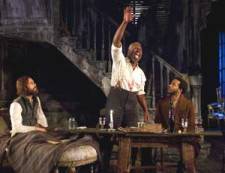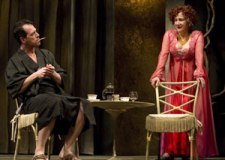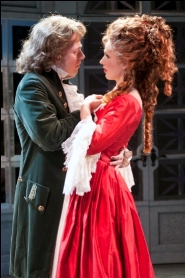Category: "Review"
Review: Gruesome Playground Injuries
Feb 8th

If the title of Rajiv Joseph’s new play Gruesome Playground Injuries isn’t off-putting enough, what transpires onstage certainly is. This dark comedy about two friends who compare the all-too-visible scars from various physical traumas over the course of many years might have worked as an outrageous one-act. But drawn out to a full-length evening it becomes the theatrical equivalent of rubbernecking at a highway car crash.
The playwright--whose Pulitzer-Prize nominated Bengal Tiger at the Baghdad Zoo, soon to arrive on Broadway, is apparently far more substantial—does display a facility for dark humor in this two-character work about Kayleen (Jennifer Carpenter) and Doug (Pablo Schreiber), who first meet in their parochial school infirmary. The ensuing vignettes depict their equally ill-fated encounters over the ensuing years, in which the clearly foolhardy Doug has, among other things, blown out one of his eyes with a firecracker and been hit by lightning, while the troubled Kaylee has developed a propensity for self-mutilation.
With little besides the results of these horrific incidents on display, the characters emerge as little more than cipher-like devices fueling the evening’s nasty humor. The detached, clinical nature of the proceedings is further accentuated by Neil Patel’s antiseptic set design--resembling a hospital room and including several rows of audience members onstage as if observers at an operating theater--and by the decision to have the actors doing their costume and make-up changes in full view.
The performers do what they can with their schematic roles, with Carpenter, in particular, displaying the sort of edge charisma edginess that she uses to such fine effect on TV’s Dexter. But their efforts are not enough to overcome this deliberately provocative but ultimately shallow exercise.
Second Stage Theatre, 305 W. 43rd St. 212-246-4422. www.2st.com.
Review: The Whipping Man
Feb 7th

It’s easy to see why Matthew Lopez’s play The Whipping Man has enjoyed considerable success on the regional theater circuit. Set during the final days of the Civil War and concerning an impromptu Passover Seder conducted by a pair of black slaves and their former owner, it seems cannily designed to appeal to both African-American and Jewish audiences.
Unfortunately, the play, now receiving its New York premiere courtesy of the Manhattan Theatre Club, is less interesting than its premise. Tedious and plodding for most of its running time, it relies on a sensationalistic early scene and some melodramatic revelations towards the end for dramatic effect.
Set in a ruined antebellum mansion in Richmond, Virginia, it depicts the fateful encounter among three figures: Caleb (Jay Wilkison), the Jewish soldier who has limped back to his home with a grave injury to his leg; and Simon (Andre Bruagher) and John (Andre Holland), his family’s former slaves who have been converted to their faith.
Determining that Caleb is suffering from gangrene, Simon decides that his leg must be removed, resulting in a grisly, vividly staged amputation scene that will certainly have audiences cringing.
Not too much happens after that, with the characters engaging in windy, philosophical discussions about the horrors of the war and the issues for which it was fought. A conflict arises between Simon, who has returned to the home to safeguard the family’s possessions, and John, who has resorted to thievery and is using the house to store his booty.
The two slaves, with Caleb’s reluctant agreement, decide to hold a Seder, which provides a neatly dramatic parallel between the plight of the Jewish slaves in Egypt and their 19th century black contemporaries.
There are few dramatic fireworks until shortly before the play’s conclusion, when Simon learns shattering information about his family that propels him to action.
Atmospherically staged by Doug Hughes and featuring a gorgeously dilapidated set designed by John Lee Beatty and moodily lit by Ben Stanton, the production does feature compelling performances, especially by the ever-reliable Braugher, who brings complex shadings to his role as the conflicted ex-slave. But for all its thematic ambition, this historical drama never comes to dramatic life.
City Center Stage I, 131 W. 55th St. 212-581-1212. www.nycitycenter.org.
Review: The Milk Train Doesn't Stop Here Anymore
Feb 4th
 Tennessee Williams’ 1963 play The Milk Train Doesn’t Stop Here Anymore has defied success in all its previous incarnations. It flopped on Broadway not once but twice and the 1968 film adaptation—retitled Boom and starring Elizabeth Taylor and Richard Burton—fared no better. The current Off-Broadway revival being presented by the Roundabout Theatre Company, while essential viewing for Williams completists, is unlikely to salvage its reputation.
Tennessee Williams’ 1963 play The Milk Train Doesn’t Stop Here Anymore has defied success in all its previous incarnations. It flopped on Broadway not once but twice and the 1968 film adaptation—retitled Boom and starring Elizabeth Taylor and Richard Burton—fared no better. The current Off-Broadway revival being presented by the Roundabout Theatre Company, while essential viewing for Williams completists, is unlikely to salvage its reputation.
Here, the formidable Olympia Dukakis assumes the iconic role of Flora “Sissy” Goforth—an aging, widowed grande dame spending what are clearly her last days in her luxurious mountaintop villa on Italy’s Amalfi Coast. In between swilling alcohol and popping painkillers, she dictates her memoirs to her prim secretary, Blackie (Maggie Lacey).
Entering the picture is the handsome, gigolo-like Christopher (Darren Pettie), a former poet turned artist who designs mobiles. He has made a habit of attending to elderly women who have a propensity to soon kick the bucket, which has earned him the nickname of “Angel of Death.”
This hallucinatory meditation on mortality, written shortly after the death of the playwright’s longtime lover, is bizarre in the extreme. The central character, bearing elements of numerous other troubled female figures from the Williams canon, is the sort of grotesque creature for whom dressing up in full Kabuki regalia is a normal occurrence.
Adding to the camp factor is the character dubbed the “Witch of Capri,” Flora’s bitchy crony who has no compunctions about seducing everyone in sight, from her servants to the studly interloper. Although normally played by a woman, the role is entertainingly essayed here by Edward Hibbett, much in the same vein as Noel Coward in the film.
Although the play intermittently showcases Williams’ gift for blending poeticism with raucous humor, its disparate stylistic elements never fully coalesce. This rendition staged by Michael Wilson--cribbed from various drafts of the play and previously seen at Connecticut’s Hartford Stage—is certainly stylish but ultimately fails to bring cohesion to the muddled proceedings.
Dukakis manages at times to effectively convey Goforth’s grotesqueness. But her strained efforts are far too visible—the actress lacks the necessary diva-like presence to fully put the role over. Not helping matters is Pettie’s male ingénue. Although possessing serious sex appeal—his impressive physical attributes are fully revealed at one point—his blank mien makes the character no so much mysterious as simply bland.
Laura Pels Theatre, 111 W. 46th St. 212-719-1300. www.roundabouttheatre.org.
Reviews: The New York Idea / What the Public Wants
Feb 3rd
 Two current revivals of vintage plays, one American and one British, demonstrate that not every forgotten drama from the past is necessarily worth excavating. Both the Mint Theater Company’s revival of Arnold Bennett’s 1909 What the Public Wants and the Atlantic Theater Company’s world premiere adaptation by David Auburn (Proof) of Langdon Mitchell’s 1906 The New York Idea mainly come across as theatrical relics.
Two current revivals of vintage plays, one American and one British, demonstrate that not every forgotten drama from the past is necessarily worth excavating. Both the Mint Theater Company’s revival of Arnold Bennett’s 1909 What the Public Wants and the Atlantic Theater Company’s world premiere adaptation by David Auburn (Proof) of Langdon Mitchell’s 1906 The New York Idea mainly come across as theatrical relics.
Both plays seem to have been unearthed for their supposed contemporary relevance. Mitchell’s comedy is a portrait of upper crust New York society dealing with new ideas about divorce and the role of women. Bennett’s is about a tabloid newspaper magnate who brings to mind a certain current media tycoon. Unfortunately, neither play works particularly well on dramatic terms.
I’m not familiar with the original version of Mitchell’s original, so it’s hard to know exactly how Auburn has transformed it, although no doubt extensive cutting was involved. It portrays the romantic roundelay among several characters: Cynthia (Jaime Ray Newman), a free-spirited young divorcee about to get remarried to the older Philip (Michael Countryman), a straight-laced judge; Philip’s ex-wife Vida (Francesca Faridany), who displays surprisingly modern attitudes about sex and marriage; and Cynthia’s former husband John (Jeremy Shamos), now in such desperate financial straits that he is forced to sell off all of his possessions, including her beloved race horse.
Observing from the sidelines are several peripheral characters, including the wealthy Sir Wilfrid (Rick Holmes), who attempts to woo Cynthia despite her upcoming nuptials.
While the play aims to be the sort of madcap romantic farce that would later be realized to perfection in such works as The Philadelphia Story, none of the situations or dialogue have the required comic zing. We care little about the characters, who seem little more than convenient mouthpieces for the provocative societal ideas being expressed. The climax of the play concerns the reconciliation of two of the former spouses, but by then we are so unengaged that it registers with little effect.
Under the sluggish direction of Mark Brokaw, the performers mainly struggle with their stock characters, although Newman, making her New York stage debut, brings a vivacity and charm to Cynthia that is largely missing from the rest of the evening.
 The Mint, normally so savvy with their theatrical exhumations, is at a similar loss with this British comedy by Bennett, a wildly popular playwright in his day. Loosely based on the real-life figure of Lord Northcliffe, the founder of The Daily Mail, What the Public Wants originally found success both on the West End and in New York.
The Mint, normally so savvy with their theatrical exhumations, is at a similar loss with this British comedy by Bennett, a wildly popular playwright in his day. Loosely based on the real-life figure of Lord Northcliffe, the founder of The Daily Mail, What the Public Wants originally found success both on the West End and in New York.
It’s easy to see why the work seemed ripe for revival, dealing as it does with a publishing mogul who is desperate for both huge circulation and social prestige. He is the rich and successful Sir Charles Worgan (Rob Breckenridge), whose newspaper empire is based on feeding its readership sensationalism rather than the truth.
The return of his brother Francis (Marc Vietor) after nearly two decades spent abroad spurs Charles into self-reflection and a newfound desire to change his ways. Deciding that he needs to be married in order to become a respected member of society, he impulsively proposes to childhood friend Emily (Ellen Adair), now a struggling actress.
But when couple returns to their hometown for a family dinner, the resulting contentious family dynamics put the spotlight on their clashing values.
The playwright’s satirical observations, while certainly prescient for their day, seem all too familiar and redundant by now. The work plods along, suffering from a surfeit of minor characters, including a prickly theater critic apoplectic over the split infinitives popping up in his edited prose.
Although Matthew Arnold’s staging and the performances by the ensemble reflect the Mint’s usual solid level of professionalism, it’s hard to imagine that this antiquated work will be what the public wants.
The New York Idea
Lucille Lortel Theatre, 121 Christopher St. 212-279-4200. www.ticketcentral.com.
What the Public Wants
Mint Theater, 311 W. 43rd St. 212-315-0231, www.minttheater.org.
Review: The Misanthrope
Feb 2nd
 It’s such a welcome pleasure to once again hear poet Richard Wilbur’s gorgeously elegant verse translation of The Misanthrope that one can almost, but not quite, overlook the general blandness of the Pearl Theatre Company’s revival. While Moliere’s 17th century comedy has lost none of its sharpness or power to amuse, this overly tame production hardly serves as a proper introduction to this too rarely performed classic.
It’s such a welcome pleasure to once again hear poet Richard Wilbur’s gorgeously elegant verse translation of The Misanthrope that one can almost, but not quite, overlook the general blandness of the Pearl Theatre Company’s revival. While Moliere’s 17th century comedy has lost none of its sharpness or power to amuse, this overly tame production hardly serves as a proper introduction to this too rarely performed classic.
Company regular Sean McNall stars as Alceste, the titular character who suffers fools badly and who can’t restrain himself from telling the truth to the fops and hypocrites surrounding him, consequences be damned. Declaring that he plans to “break with the whole human race,” he suddenly finds his principles tested when he falls in love with the beautiful but shallow Celimene (Janie Brookshire), the gossipy darling of the Parisian social scene who is fawned over by leagues of male admirers.
For some reason, director Joseph Hanreddy has updated the action to the 18th century, a curious choice since the playwright was pointedly satirizing the shallow conventions of the court of Louis XVI. And while it’s admirable that his restrained staging avoids the sort of overly broad comedy that too often afflicts productions of Moliere’s works, the proceedings are far too enervating.
Part of the problem is McNall’s performance. The actor is normally very reliable, but his too understated turn robs his character of the delicious outrageousness that normally provides the play of much of its humor. Equally underwhelming is Brookshire’s coquettish Celimene, although admittedly the actress looks smashing in Sam Fleming’s handsome costumes.
The supporting performances are mainly fine, with Kern McFadden particularly amusing as Oronte, the self-styled poet whose verses Alceste can’t help but nastily deride.
While the Pearl can’t be overly criticized for their inevitably modest production values, Harry Feiner’s set design is particularly underwhelming, looking more like a California patio than an elegant Parisian drawing room.
City Center Stage II, 131 W. 55th St. 212-581-1212. www.nycitycenter.org.